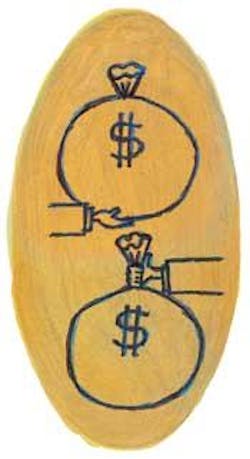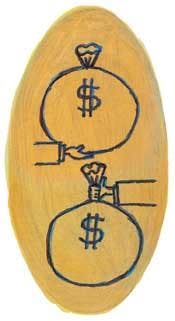Buy–Sell Agreements
Here are three smart moves you need to make now
by Jim Biesterfelt
If you own a dental practice and don't have a buy–sell agreement, getting it in place ASAP is one of the smartest business moves you can make, according to attorney Stephen P. Rickles, J.D. "That is No. 1," he says. No. 2: Use a professional appraiser with expertise in dental practices to value the business. And No. 3: Have a plan in place for paying the purchase price when death, disability, retirement, or another event triggers the buy–sell agreement.
"Those three moves will go a long way toward maximizing the value of your practice for both you and your family," states Rickles, a nationally recognized estate planning, employee benefits, and tax attorney with the Denver law firm of Berenbaum, Weinshienk & Eason, P.C.
No. 1: Put buy–sell in place
Drafted by an attorney, a buy–sell agreement is a legally binding document, which stipulates that if an owner leaves the practice because of death, disability, retirement, or another triggering event, the remaining owner(s) will buy out that owner or the owner's estate. Without a buy–sell agreement, the partner's ability to continue the practice could be jeopardized, and the deceased owner's family could be left with an illiquid asset with far less than the hoped–for value.
Similarly, a sole practitioner who becomes disabled absent a buy–sell agreement with a dentist colleague could be forced to sell the practice for a much lower price than planned. And if the sole practitioner dies, the surviving spouse and family could face additional complications. According to Rickles, many states, including Colorado, prohibit a dental practice from being owned by nondentists.
If the surviving spouse or another family member is not a dentist, the family would be faced with liquidating at "fire sale" prices. "A buy–sell agreement avoids these problems by creating the mechanism to sell a practice in an easier, more profitable fashion," Rickles says.
Even a dental practice with owners who are members of the same family should have a buy–sell agreement that clearly lays out the succession plan so there are no misunderstandings later.
"A good buy–sell agreement will address the specific issues of the owners," Rickles says. "That's why most dental practices should avoid generic agreements. My recommendation is to engage the services of competent legal counsel who has experience in this area of the law for help in drafting a customized buy–sell agreement."
No. 2: Value the practice
Central to a buy–sell agreement is establishing a purchase price or the method to be used to determine the value of the ownership share at the time of purchase. According to Rickles, most dental practices are valued based on their assets, rather than using a stock value. These assets include accounts receivable, patient records, furniture and equipment, and "goodwill" value.
"Goodwill value is a subjective judgment based on the earnings history of the practice and the percentage of those earnings that are assumed will be continued under the new ownership," Rickles explains.
One of his clients, for example, is an orthodontist whose practice was valued at $780,000. Of that, $490,000 was attributed to goodwill.
A practice in which a departing dentist takes steps to facilitate patient retention typically will generate more goodwill value than a practice that does not get this boost. In addition, part of practice valuation should include a contingency plan to adjust the price of the practice based on experience.
"The actual goodwill value could be either better or worse after purchase," Rickles explains. "An attorney can help the parties negotiate to protect the purchaser against the downside if goodwill does not materialize as anticipated, and conversely, enable the seller to participate in the upside if goodwill is greater than expected."
Because practice valuation is so critical to the success of a buy–sell agreement, Rickles recommends hiring a professional appraiser with experience in the dental market.
Your attorney can recommend an appraiser, or check the Web site of the American Dental Association (ADA) for its "Directory of Dental Practice Appraisers and Brokers" at www.ada.org. The ADA also has available a publication, Valuing a Practice: A Guide for Dentists, with details of particular valuation methods.
"Then, don't forget to update the valuation periodically," Rickles adds.
No. 3: Plan how to pay
The money to carry out a buy–sell agreement can come from the dentist's cash flow, a bank loan, or life and disability insurance on the owner. Rickles prefers the third option.
"In the absence of life and disability insurance, the funding for the purchase is much more difficult," he says. "With insurance in place, it's much easier for the buyer to assume ownership without having to worry about the pay–out."
The type of life insurance purchased depends, again, on the owners' situation and goals. If the buy–sell agreement is primarily to protect the owners against an unexpected death prior to retirement, then term life insurance is an inexpensive option. However, if the owners want life insurance that builds cash value to help buy out a retiring dentist, then a product such as universal life insurance would be the appropriate option, albeit more expensive than term.
"Either way, the insurance amount ideally should cover the full purchase price of the practice — or even more — to anticipate the value of the practice growing over time," Rickles says. And what if one owner is uninsurable? "In that case, there could be an installment–sale agreement for the uninsured dentist's interest," he offers.
In terms of how to own the insurance, either a cross purchase or a redemption arrangement can be used. With a cross–purchase, each owner is the applicant, owner, premium payer, and beneficiary on the policies on the lives of the other owners. At the death of an owner, the remaining owners are obligated to use the proceeds of the life insurance to buy the deceased dentist's share of the practice from his or her estate.
With a redemption arrangement, the practice owns, pays the premiums for, and is the beneficiary of each policy on the lives of the owners. At the death of one of them, the practice uses the insurance proceeds to buy the deceased owner's share in the practice from the estate.
"Both approaches have advantages and disadvantages, so it's important for the owners to discuss which one feels most fair to them," Rickles says. In addition, the owners should consider the tax implications of each, which vary depending upon the type of business entity involved and the contingencies covered by the buy–sell arrangement. An attorney and accountant can advise on these matters.
In Rickles' experience, an unexpected death is top–of–mind when dentists consider a buy–sell agreement, yet they often overlook the very real threat of a disability. "Disability insurance is equally important in a buy–sell agreement, so the owners will have a source of cash to buy out a disabled partner's share in the practice," he says.
What's the bottom line?
"Whether you are a sole proprietor, have one partner or many stockholders, or are part of a family–run practice, you should have a buy–sell agreement," Rickles concludes. "Customize it for your situation and fund it with life and disability insurance to protect the value of the practice you have worked so hard to build."
Editor's note: This article does not constitute legal, tax, or financial advice. Please seek professional input as appropriate to your situation.
Jim Biesterfelt is vice president of Group Special Accounts at Great–West Life & Annuity Insurance Company. Great–West Life underwrites and administers the ADA Insurance Plans and is the exclusive provider of ADA–sponsored life and disability insurance to ADA members and their families. For more information, call (866) 607–5330 or go to www.insurance.ada.org.

